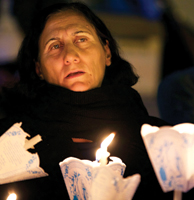Hounded out of their homes by Islamist violence, Iraqi Christians face what many fear may be their final festive season in the land of their fathers as many prepare for exile
“Jesus was born in a tent”, proclaim the words of a banner with huge significance for Iraqi Christians putting up Christmas decorations in the Mar Elias displacement camp in Kurdistan where they now live.
The 700 inhabitants of the camp, in Ankawa, a largely Christian suburb of the Kurdish capital, Erbil, make up a fraction of the 120,000 displaced faithful who have fled to Kurdistan. They all face their first Christmas away from the ancient towns and villages that have been home to their families for thousands of years.
Living in tents spread out across the camp, the current residents of Mar Elias sought sanctuary there in the summer when they fled Islamic State (IS) forces that seized the ancient city of Mosul, before taking towns and villages in the neighbouring Nineveh plains.
When I visited Mar Elias in October as part of a fact-finding and project assessment trip with the charity, Aid to the Church in Need (ACN), there was – in spite of the recent trauma – a spirit of optimism, a mood reflected in the last vestiges of the summer weather. Two months on, the mood of the people, like the weather, seems to have worsened considerably. My friends and contacts in Iraq have made no secret of the deepening feeling of despondency, which the festive season cannot quite dispel.
Undaunted, Fr Douglas Bazi, a Chaldean-Rite Catholic priest in charge of the Mar Elias displacement camp, has set about the festive celebrations with gusto. He has dragooned the young people into creating Christmas trees made of paper, and plans are afoot for big celebrations in the nearby church, a Christmas picnic, and the sharing of gifts – many of them funded by organisations such as ACN, which is providing presents for 15,000 children in Kurdistan.
Speaking from Ankawa, Fr Bazi told me: “This is actually a good time for Christmas. People in the centre here have a good opportunity to see what Christmas is really all about. After all, Jesus was born in the same situation as our people. He was a refugee just as they are.”
Fr Bazi is a man whose own story of suffering means he can look the people in the eye. Back in 2006, he was kidnapped in Baghdad and held for nine days, during which he was tortured and beaten. It was a year before he could walk again and he is still receiving treatment. He is only too aware that no amount of slogans and paper Christmas trees can take away the intense pain his people are suffering as 25 December approaches.
Theirs is a sense of loss magnified by recollections of Christmas past spent in towns and villages where the traditions dated back centuries. The most immediate problem is the onset of winter. One night of heavy rain that swept through Ankawa a month ago prompted a Dominican nun to report that the “tents were quickly filling with water”, with some collapsing and being “engulfed in mud”. After the rain is the threat of cold. Now, night-time temperatures have fallen to 4°C and next month they are likely to drop below zero.
Nisha, a 25-year-old English literature teacher in Ankawa, has been working with Chaldean Archbishop Bashar Warda of Erbil providing emergency food, hygiene products and other essentials since the summer when the Christians from Mosul and Nineveh started flooding in.
She told me that, although the majority of displaced people in Ankawa were no longer living under canvas, many hundreds were living in part-built structures – housing estates and shopping malls that lack windows and doors. There is little or no protection from the cold. Aid relief coordinators I have spoken to highlighted the threat of cold, especially to the young and the elderly. They said that the warmer weather in Mosul and Nineveh means that families have no experience of dealing with extreme cold and are unused to wearing gloves: “So many young children have chapped hands,” one said. “Their hands are so cold.”
Another referred to the use of generators, which – apart from their extortionate running costs – pose massive safety problems; people have been hanging their washing on the power lines that run between the tents.
Getting people out of tents and into accommodation with adequate protection from the cold has been an ongoing task for church leaders, who have complained bitterly of lack of government support, especially from the authorities in Baghdad.
The quickest solution has been PVC Portakabins. After our visit, Aid to the Church in Need rushed through a £300,000 scheme providing 150 Portakabins for use as temporary accommodation in District 129 of Ankawa, which was renamed “Werenfried Village”, after the charity’s late founder, Fr Werenfried van Straaten. With the cabins now in place, the families are in and making full use of both their new homes and the on-site washing facilities, with electricity and space for every family to use a camping stove. Survival through the winter now seems assured for the families, whose food and other essentials are provided by a church-organised scheme, funded by non-governmental organisations, and organised with the help of a coupon system.
Alongside homes, the Church has prioritised schooling. Again, organisations such as ACN have supported Portakabin schemes to provide basic schools so that children do not completely fall behind with their education. One school project, masterminded by Archbishop Warda, is reportedly due to open on 1 January 2015, with plans for more to follow.
All this has taken place against a backdrop of apparent squabbles between the Kurdish authorities in Erbil and the central Government in Baghdad over official registration and state recognition of schools for displaced people in the region. This, plus the fact that many of the displaced cannot get jobs because they do not speak Kurdish, means that there is an increasing desperation to leave the region. Many, especially those from Nineveh, just want to go home to their towns and villages.
Reports from Kurdistan suggest a growing frustration that the air strikes against IS have failed to secure the liberation of Nineveh and Mosul. There is a growing sense that Islamisation is here to stay. A senior Middle East cleric, who asked not to be named, told me that he and many others believed fanatics in Saudi Arabia and Turkey were bankrolling a master plan to rid the Middle East of Christians.
Unable to go home, unable to stay in Kurdistan, except in the short term, an exit from Iraq and indeed the entire region is the inescapable conclusion many have come to. The haemorrhaging of Christians in Iraq is an exodus of biblical proportions. Ankawa, and Erbil as a whole, has become a last bastion of Christianity in Iraq, with numbers of faithful swelling to 100,000, according to Archbishop Warda, half of them displaced people. Some 80,000 others – again including many displaced – live due north of Erbil in the Kurdish region of Dohuk. With Baghdad’s Christian population having shrunk by two-thirds to less than 75,000 since 2003, the total number of faithful in the country has, according to Archbishop Warda, fallen to well below 275,000, a mere fraction of the one million who were living there a decade or more ago.
If any region of Iraq were to retain its Christian communities, it would be Mosul and Nineveh because of their long-standing presence there. But, with the Christians and so many others uprooted and far from settled in their place of sanctuary, many are no doubt wondering if this Christmas will be their last in Iraq.
“If I had one message to the West, it would be ‘Give us visas’,” was the final remark Fr Bazi made before we finished speaking. While Europe and many other regions may be reluctant to issue visas this Christmas, the least we can give the displaced communities in Iraq is a roof over their head and shelter from their oppressors.
John Pontifex is head of press and information, Aid to the Church in Need (UK).





 Loading ...
Loading ...
What do you think?
You can post as a subscriber user...
User Comments (0)